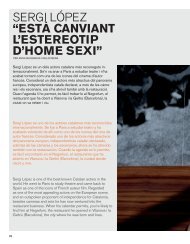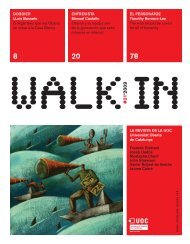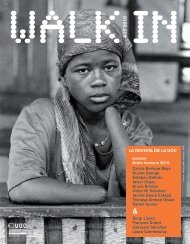II La UOC fa 15 anys II / La UOC cumple 15 años II / The ... - Walk In
II La UOC fa 15 anys II / La UOC cumple 15 años II / The ... - Walk In
II La UOC fa 15 anys II / La UOC cumple 15 años II / The ... - Walk In
Create successful ePaper yourself
Turn your PDF publications into a flip-book with our unique Google optimized e-Paper software.
MÓN <strong>UOC</strong> V<br />
Per als primers<br />
estudiants, utilitzar el<br />
ratolí era entrar en una<br />
dimensió desconeguda<br />
Para los primeros<br />
estudiantes, usar el<br />
ratón era entrar en una<br />
dimensión desconocida<br />
For the first students,<br />
just using the mouse<br />
meant venturing into an<br />
unknown dimension<br />
compte que ja n’hi havia molts que tenien coneixements, almenys bàsics,<br />
de les noves tecnologies.<br />
El 2004 la formació es reenfoca i ja no se centra en les eines, sinó en<br />
com treballar a la <strong>UOC</strong> traient-ne profit. L’objectiu final, subratlla Guitert,<br />
és que els estudiants tinguin millors competències digitals que els de les<br />
universitats presencials. Ara es treballa a partir d’un projecte virtual i els<br />
estudiants han de preparar les seves estratègies i aprendre a treballar en<br />
equips virtuals.<br />
Al 2008, la <strong>UOC</strong> ja té una competència pròpia en “ús i aplicació de<br />
les TIC en l’àmbit acadèmic i professional”. L’assignatura és obligatòria<br />
de primer semestre, de 6 crèdits, es diu “Competències TIC” i està més<br />
adaptada a cada grau. <strong>In</strong>tenta homogeneïtzar el valor afegit que aporta<br />
la <strong>UOC</strong> en l’ús de les TIC i les possibilitats de la web 2.0 . “Gairebé tothom<br />
sap fer servir les eines, però no des d’un punt de vista acadèmic”,<br />
afirma Montse Guitert. Ara l’estudiant es troba amb un ventall d’eines que<br />
ha d’usar en l’escenari d’un projecte virtual en equip per assolir les següents<br />
competències metodològiques i instrumentals: cercar i localitzar<br />
informació a la xarxa, tractar i elaborar la informació digital, presentar-la<br />
i difondre-la, adquirir estratègies de comunicació a la xarxa, dominar les<br />
funcions bàsiques de tecnologia digital, planificar i gestionar un projecte<br />
virtual, tenir una actitud digital cívica i habilitats de treball en equip en<br />
xarxa. <strong>La</strong> figura del consultor és clau com a guia i dinamitzador del procés<br />
d’aprenentatge.<br />
Fi de la segona part<br />
cionó. Su objetivo, según cuenta Guitert, ya no era tanto enseñar a utilizar<br />
las herramientas como presentar estrategias para usarlas mejor. Los estudiantes<br />
aprendían a participar en debates virtuales o a emplear una hoja<br />
de cálculo. Asimismo, se trataba de introducirlos en la metodología de estudio<br />
de la <strong>UOC</strong> sin perder de vista, sin embargo, que muchos ya poseían<br />
unos conocimientos cuando menos básicos de las nuevas tecnologías.<br />
En 2004, la formación se redefine y deja un poco de lado las herramientas<br />
para centrarse en cómo trabajar en la <strong>UOC</strong> sacándoles el máximo provecho.<br />
El objetivo final, subraya Guitert, es que las competencias digitales de<br />
sus estudiantes sean mejores que las de los de las universidades presenciales.<br />
Ahora se trabaja a partir de un proyecto virtual y los estudiantes han de<br />
preparar sus propias estrategias y aprender a trabajar en equipos virtuales.<br />
En 2008, la <strong>UOC</strong> ya cuenta con una competencia propia en “uso y<br />
aplicación de las TIC en el ámbito académico y profesional”. <strong>La</strong> asignatura,<br />
how to use the tools but more to offer strategies to make better use of<br />
them. <strong>The</strong> students learned how to participate in virtual debates and how<br />
to use a spreadsheet. Another goal was to orientate them in the <strong>UOC</strong>’s<br />
study methodology while bearing in mind that many of them already had<br />
some knowledge, however basic, of the new technologies.<br />
<strong>The</strong> course was reoriented in 2004 and came to be centred no longer<br />
on tools but on how students could get the most from their <strong>UOC</strong> programme.<br />
Guitert stresses that the ultimate goal is for <strong>UOC</strong> students to have<br />
stronger digital skills than students at conventional universities. Now the<br />
training focuses on a digital project, and the students have to develop<br />
their own strategies and learn how to work on virtual teams.<br />
By 2008, the <strong>UOC</strong> already had a competency of its own, defined as<br />
“the use and application of ICTs in the academic and professional realms”.<br />
<strong>The</strong> 6-credit course helps students develop this skill and is compulsory<br />
obligatoria de primer semestre y de 6 créditos, se titula “Competencias<br />
TIC” y está adaptada a cada grado. Pretende homogeneizar el valor añadido<br />
que aporta la <strong>UOC</strong> en el uso de las TIC y las posibilidades de la web<br />
2.0. “Prácticamente todo el mundo sabe utilizar las herramientas, pero no<br />
desde un punto de vista académico”, afirma Montse Guitert. Ahora, el estudiante<br />
tiene ante sí un abanico de instrumentos que ha de emplear en el<br />
marco de un proyecto virtual en equipo para alcanzar las siguientes competencias<br />
metodológicas e instrumentales: buscar y localizar información<br />
en la red, tratar y elaborar la información digital, presentarla y difundirla,<br />
adquirir estrategias de comunicación en la red, dominar las funciones básicas<br />
de tecnología digital, planificar y gestionar un proyecto virtual, tener<br />
una actitud digital cívica y habilidades de trabajo en equipo en red. <strong>La</strong><br />
figura del consultor es fundamental en tanto que guía y dinamizador del<br />
proceso de aprendizaje.<br />
Fin de la segunda parte<br />
during the first term. It is called “ICT Competencies” and is adapted to<br />
each degree programme. It aims to standardise the added value of studying<br />
at the <strong>UOC</strong> in the use of ICTs and the potential of Web 2.0. “Almost<br />
everyone knows how to use the tools, but not from an academic standpoint”,<br />
claims Montse Guitert. Now students have a whole range of tools at<br />
their disposal that they must use as part of a virtual team project in order<br />
to achieve the following methodological and practical competencies: finding<br />
and pinpointing information on the Web, processing and developing<br />
digital information, presenting and disseminating this information, acquiring<br />
web-based communication strategies, mastering the basic functions<br />
of digital technology, planning and managing a virtual project, and having<br />
a responsible digital attitude and team networking skills. <strong>The</strong> figure of the<br />
consultant is crucial to guiding and spurring the learning process.<br />
End of part two





